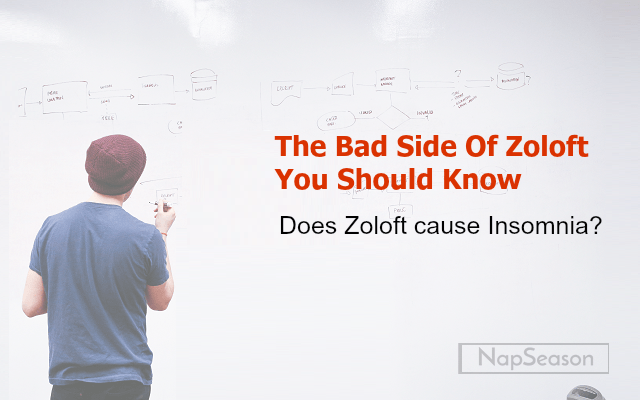Have you recently starting taking Zoloft and find yourself feeling wired at all times?
Or perhaps you are wondering how long the feeling will last until you can sleep normal again.
Zoloft (Sertraline hydrochloride) is a prescribed anti-depression treatment that also helps to treat obsessive-compulsive disorder (OCD), premenstrual dysphoric disorders (PMDD), and social anxiety disorder.
In 2005, Zoloft became the most popularly prescribed antidepressant in the United States as nearly 30 million prescriptions were given out each year. Unfortunately, users started to report sleep problems.
Common Side Effects of Zoloft
We’ve all heard about the use of prescription drugs and their endless list of side effects.
Some of the side effects make the actual condition worse or even harder to treat it. Zoloft is one of them.
Common Side Effects of Zoloft includes the following:
- Nervousness
- Dizziness
- Insomnia
- Sexual dysfunction
- Skin rash
- Nausea
- Diarrhea
- Difficulty in having an orgasm
- Drowsiness
- Upset stomach
- Constipation
- Dry mouth
- Weight loss
- Abnormal ejaculation
So to the question does Zoloft cause insomnia? The answer is without a doubt a yes!
Most patients who were being treated for OCD seemed to experience cases of insomnia, while women with PMDD did not.
The Zoloft dosage depends on the actual condition that is being treated. Be sure to get medical help right away if severe side effects occur such as vision changes, blurred vision, eye pain and swelling, dark-colored vomit, and black/bloody stools.
Research done by ehealthme shows the following.
- Pie chart results
- Gender %
Why does Zoloft cause insomnia?
Zoloft is a selective serotonin reuptake inhibitor (SSRI), which helps to increase the levels of serotonin in the brain. This will result in mood improvements and an increase in energy. This may work great during the day. However, it does cause problems at night.
When the serotonin levels in the body are raised too much the blood vessels can constrict, leading to hypertension, and thicken the heart valves.
High levels of serotonin can lead to serotonin syndrome which will involve symptoms like shivering, agitation, confusion, insomnia, high blood pressure, headache and more. This is probably why people get sleep problems after taking Zoloft.
Another primary cause of insomnia with Zoloft is sleep hygiene. This means to skip anything with caffeine after 4 pm or winding down with less stimulating activities to encourage melatonin production.
How long will the Insomnia last?
The symptoms of insomnia when taking Zoloft often starts to reduce after a few weeks of treatment. The symptoms may not completely disappear but should hopefully diminish to a manageable level.
However, those who still continue to experience cases of insomnia while continuing to take Zoloft should consult her doctor and prescribe a low-dose of antidepressants such as Trazodone.
If Zoloft is making you feel drowsy, be sure to take the medication during the evening at least four hours before your scheduled rest time.
What time to take it?
One thing to keep in mind is that the Sertraline takes an average of six to eight hours to kick in. You will gain the maximum results within that time frame.
Zoloft has a long half-life of about twenty-six hours. This allows it to build up in your body, which means after a while each dose will require half the amount than what you started with in the beginning.
Many users have found that taking Zoloft early in the morning helps in preventing the symptoms of insomnia. This helps you to stay awake and energized in the morning and allow your body to slow down towards early night time.
197 people voted on what time of the day they take their Zoloft. Over 31% of users recommend taking Zoloft during the mid-morning hours, starting at 8 am. Over 27% encourage taking the medication early in the morning, or when you first wake up.
Waking up anxious
Advice
For most people it is not desirable to take SSRIs for long periods of time.
With all the common side effects that you may experience with Zoloft, there are natural solutions that may help.
With the loss of appetite, try to eat on a schedule even if the portions are small. Additionally, not taking any caffeine within several hours before bedtime will help to encourage the production of melatonin. Eventually, the side effects should reduce and ultimately disappear.
Never attempt to quit taking any form of SSRI like Zoloft immediately. Always be sure to consult with your physician and follow their guidelines to reduce the dosage gradually and come off Zoloft on a safe measure.
Be sure to get to medical help immediately if you develop the following:
- Hallucinations
- Rapid heartbeat
- Loss of coordination
- Dizziness
- Severe diarrhea
- Fever
If you are currently taking Zoloft and experiencing cases of insomnia, be sure to consult your doctor right away and discuss the issue. This medication may also increase high levels of serotonin, which may lead to a serious condition called serotonin toxicity syndrome.
It is important to keep in mind that insomnia may be a short-term side effect of taking Zoloft, which makes a non-prescription solution an ideal method.
If you are currently taking Zoloft and have been suffering from insomnia since you started, consider discussing the issue with your healthcare physician.
Some solutions are readily available. Like changing the time of taking Zoloft However, aim to make an informed decision when dealing with prescription medications.
Have you recently started taking Zoloft can have trouble sleeping? What have you done that has or hasn’t helped with the condition? Comment below and let us know!

